NavSource Online: Submarine Photo Archive
V-2 (SF-5)
Bass (SS-164)

Please report any broken links or trouble you might come across to the Webmaster.
Please take a moment to let us know so that we can correct any problems and make your visit as enjoyable and as informative as possible.

| Click On Image For Full Size | Size | Image Description | Source | |
|---|---|---|---|---|
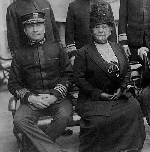 |
68k | The sponsor of V-2 (SS-164), Mrs. Douglas E. Dismukes, wife of Captain Dismukes, sit next to each other on 27 December 1924 on the V-2's launching day. | Image cropped from # NH 56927 Mount Vernon, submitted by Bill Gonyo. | |
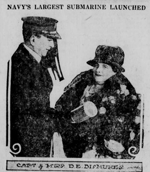 0816429 |
NR | NAVY'S LARGEST SUBMARINE LAUNCHED | Image and text provided by Alaska State Library Historical Collections. Photo from The Alaska Daily Empire. [volume] (Juneau, Alaska) 1912-1926, 09 January 1925, Image 6 via chroniclingamerica.loc.gov. | |
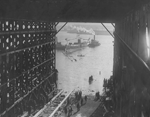 0816423 |
161k | The V-2 (SS-164), Uncle Sam's largest sea-going submarine, in an artistic setting after it had made its initial dip from the ways of the Portsmouth, NH, Navy Yard, 27 December 1924. | Photo courtesy of Dale Hargrave. | |
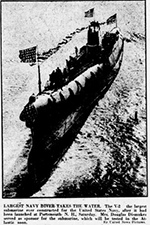 |
1.27k | LARGEST NAVY DIVER-TAKES THE WATER. The V-2 (SS-164) the largest submarine ever constructed for the United Stales Navy, has been launched at Portsmouth. N. IL, Saturday. Mrs. Douglas Dismukes served as sponsor for the submarine, which will be tested in the Atlantic. |
Image and text provided by Library of Congress, Washington, DC. Photo from Evening Star.(Washington, D.C.) 1854-1972, 29 December 1924, Image 17, via chroniclingamerica.loc.gov. |
|
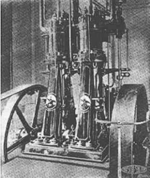 |
134k | PDF entitled "How the Diesel engine came to America." On 09/26/25 they were installed on the V-2. |
Photo courtesy of subvetpaul.com. | |
 |
299k | Photo probably taken during trials in 1925. Caption reads V-2 "Full Speed Run". | USN photo courtesy of Angie Mattke. | |
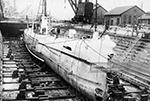 |
728k | V-2 (SS-164) overhauled in drydock at the Brooklyn Navy Yard. | Photo by Harry Warnecke/NY Daily News Archive via Getty Images courtesy of gettyimages.com. | |
 |
565k | Portside view of the V-2 (SS-164) underway, circa 1920's. Note small boat after the conning tower. | USN photo thanks to Jim Kurrasch @ Battleship Iowa, Pacific Battleship Center. | |
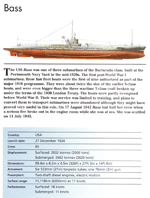 |
294k | History of the V-2 (SS-164). | Text & photo courtesy of Scott Koen & ussnewyork.com. | |
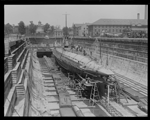 |
357k | V-2 (SS-164) in Charlestown Navy Yard, 1927. | Photo courtesy of the Boston Public Library, Leslie Jones Collection via Sean Hert & flickr.com. | |
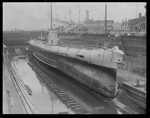 |
274k | V-2 (SS-164) in Charlestown Navy Yard, 1927. | Photo courtesy of the Boston Public Library, Leslie Jones Collection via Sean Hert & flickr.com. | |
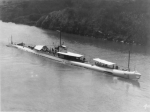 |
183k | Starboard side view of the V-2 (SS-164) probably transiting the Panama canal, circa late 1920's. | USN photo courtesy of Darryl L. Baker. | |
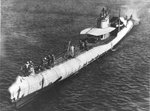 |
195k | Portside view of the V-2 (SS-164) probably transiting the Panama canal, circa late 1920's. | USN photo courtesy of Darryl L. Baker. | |
 |
77k | Fleet submarines had to be far larger than their predecessors to reach higher speeds & to run greater distances. V-2 (SS-164) lies alongside S-46 (SS-157) at the sub base in Coco Solo in the Canal Zone, circa mid 1920's. In the background is the minesweeper Swan (AM-34). Note the big telescopic masts fore & aft, intended to raise the submarine's radio antennas and thus to increase her radio range. | Photo & text courtesy of U.S. Submarines Through 1945, An Illustrated Design History by Norman Friedman. Naval Institute Press. |
|
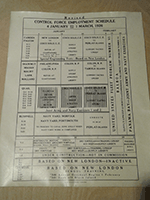 |
1.72k | Control Force Employment Schedule, 4 January to 1 March 1926. US Fleet Problem Number VI. | Photo courtesy of Steve Ireland. | |
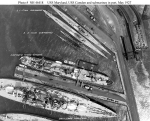 |
154k | Battleship Maryland (BB-46); Submarine Tender Camden (AS-6); two unknown S-boats; and two V-1 class submarines, possibly Barracuda (SS-163), Bass (SS-164) and or Bonita (SS-165) in port in May 1927. Note the tremendous difference in size between the S-boats and V-1 class submarines. |
Photo # NH 46418 courtesy of the U.S. Naval Historical Center. | |
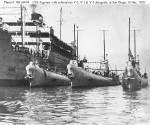 |
113k | V-1 class submarines alongside Argonne (AS-10), at San Diego, California, 10 December 1927.
The submarines are (from left to right): Bass (SS-164); Barracuda (SS-163) and Bonita (SS-165). |
Courtesy of the San Francisco Maritime Museum, San Francisco, California, 1969. USN photo # NH 69094, from the collections of the US Naval Historical Center. | |
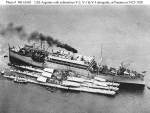 |
129k | Argonne (AS-10) in Panama waters, 1927-1928, while en route to join the Battle Fleet.
The submarines alongside her are (from outboard to inboard):
The submarines are (from left to right): Bass (SS-164); Barracuda (SS-163) and Bonita (SS-165). |
USN photo # NH 61683, from the collections of the US Naval Historical Center. | |
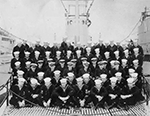 |
202k | Crew of a Barracuda class (SS-163/5) gather on deck for a group picture at Pearl Harbor prior to 1928. The Barracudas had their 5"/51 cal guns replaced in 1928 with smaller 3"/50's. She still has the larger 5"/51 cal gun. The crew is seated on the forward gun deck and the gun itself is raised to its max elevation to give the crew the room to gather. To the right of the boat is the submarine Narwhal (SS-167). | Text courtesy of David Johnston Photo i.d. courtesy of Dave Decrevel, John Hart, Ric Hedman & David Johnston Photo courtesy of Doug Sheley via flickr.com. | |
 | 65k | Gunnery exercises with a Barracuda class (SS-163/5) submarine. This photo was originally thought to be the Argonaut (SS-166). However, the configuration of the port and starboard running lights and the tall posts on the deck just aft of the fairwater rule this out. These are Kingposts used for hoisting the small boats out of their housing on the after deck. These kingposts were not present on the Argonaut. This is a Barracudas class boat and was taken prior to 1928. The Barracudas had their 5"/51 cal guns replaced in 1928 with smaller 3"/50's. She still has the larger 5"/51 cal gun. | Text courtesy of David Johnston Photo i.d. courtesy of Dave Decrevel, John Hart, Ric Hedman, John Hummel & David Johnston USNHC photograph # NH 62906, from the collection of Fleet Admiral Chester W. Nimitz. |
|
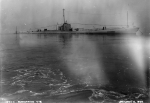 |
225k | Starboard side view of the V-2 (SS-164) on 2 January 1929 at anchor, probably on the West Coast. | USN photo courtesy of Darryl L. Baker. | |
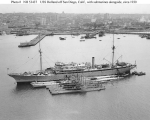 |
102k | Holland (AS-3) moored at San Diego, CA., circa 1930. Submarines alongside, apparently holding inspection, are (from inboard): V-3 (SF-6), later Bonita (SS-165); V-2 (SF-5), later Bass (SS-164); S-45 (SS-156); S-43 (SS-154); S-44 (SS-155); and S-42 (SS-153); | USN photo # NH 53437, from the collections of the US Naval Historical Center. | |
 |
1.32k | Submarines at San Pedro July to August 32 Olympics. Inboard from left to right; Narwhal (SS-167), Nautilus (SS-168) & Bass (SS-164). Back of the photo is labeled...to accomadate visitors? |
Photo courtesy of John Pakusich & John Pat via David Way, Curator, Battleship Iowa BB 61, Pacific Battleship Center,250 S. Harbor Blvd., Berth 87, San Pedro, CA 90731 | |
 |
175k | Broadside view of the Bass (SS-164) at Pearl Harbor, 11 February 1932. | USN photo. | |
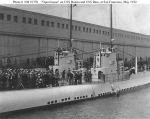 |
89k | Bass (SS-164), outboard and Bonita (SS-165) with civilian visitors on board, at San Francisco, California, May 1932. Note that Bass has a 3"/50 deck gun, while Bonita carries a 5"/51. Also note the retractable embarkation ladder built into Bass's hull amidships. Photographed by Lauzin. | USN photo # NH 91778, from the collections of the US Naval Historical Center. | |
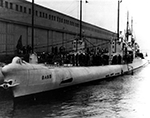 |
119k | Bass (SS-164), outboard and Bonita (SS-165) with civilian visitors on board, at San Francisco, California, May 1932. Photographed by Lauzin. | Source: Naval History and Heritage Command, Photo No. NH 91779 courtesy of Mike Green. | |
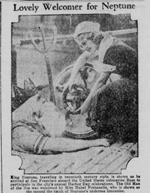 0816428 |
NR | Lovely Welcomer for Neptune King Neptune, traveling in twentieth century style, is shown as he arrived at San Francisco aboard the United States submarine Bass (SS-164) to participate in the city's annual Harbor Day celebrations. The Old Man of the Sea was welcomed by Miss Mabel Fontanella, who is shown as she opened the hatch of Neptune's undersea limousine. | Image and text provided by University of Nebraska-Lincoln Libraries, Lincoln, NE. Photo from The Frontier. (O'Neill City, Holt County, Neb.) 1880-1965, 13 October 1932, Image 6, via chroniclingamerica.loc.gov. |
|
 0816802r |
1.10k | Holland (AS-3) at anchor in the harbor at San Diego, CA., 10 November 1932, with Nautilus (SS-168), Narwhal (SS-167) and Bass (SS-164) alongside. | US National Archives photo # 80G-463339, a US Navy photo now in the collections of the US National Archives courtesy of Rick Davis, Mike Brock via Gary Priolo. | |
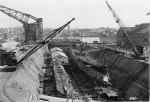 |
459k | The Bass (SS-164) is seen in dry dock one at Mare Island between 19 September and 31 October 1933. The yard's 150 ton floating crane is on the far left. The target raft 124 (the long narrow vessel with workers on top), YF-201 and 200 are in dock with the Bass on the left. The bow on the right is the San Francisco (CA-38) being outfitted at yard. I believe that the name was painted in white since the photo is likely taken on Navy Day, Friday 10/27/1933. Note the crowd of civilians on the dock side and the manned gun mount on Bass. In the 1930s invited quest were on the yard during Navy Day observances. Big times for the right folks. |
USN photo courtesy of Darryl L. Baker. | |
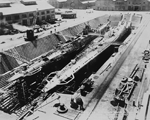 0816426 |
264k | Bass (SS-164) & Bonita (SS-165) are in Mare Island's dry dock one in May 1933. Bass is the to the left and of course Bonita is to the right. This is Bonita's 2nd docking during her overhaul thus her better paint job while this is Bass's first docking during her overhaul. They both undocked on 7 July 1933. Both re-docked on 18 July 1933 until 8 September 1933. | HABS No. CA-1543-BP-19., courtesy of Library of Congress via Darryl L. Baker. | |
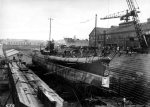 |
141k | The Bass (SS-164) when she was assigned to Rotating Reserve Submarine Division 15, is seen in dry dock one at Mare Island between 19 September and 31 October 1933. The bow on the right is the San Francisco (CA-38) being outfitted at yard. Bass shows her bulbous forefoot (carrying her bow torpedo tubes) and her clipper stern & flared deck. As in many surface ships, the bulbous bow was intended to reduce wave-making resistance & thus to improve the submarine's surface speed; the unusual bow was expected to make the deck drier. |
USN photo courtesy of ussubvetsofworldwarii.org web site. Partial text from DANFS & partial text courtesy of U.S. Submarines Through 1945, An Illustrated Design History by Norman Friedman. Naval Institute Press. |
|
 |
83k | Tender and submarines at dock in Juneau, Alaska, July, 1934. At far left, tender Holland (AS-3), submarines (l to r) Bass (SS-164), Bonita (SS-165), Barracuda (SS-163), Nautilus (SS-168) and Narwhal (SS-167). The mill of the Alaska Juneau Gold Mining Company is in the background. | Photo by Winter & Pond courtesy of the Alaska State Library. Submitted by Joseph M. Radigan (of blessed memory) | |
 | 417k | Holland (AS-3) with seven submarines alongside, in San Diego harbor, California, possibly around 24 December 1934. The submarines are (from left to right): Cachalot (SS-170); Dolphin (SS-169); Barracuda(SS-163); Bass (SS-164); Bonita (SS-165); Nautilus (SS-168); and Narwhal (SS-167) | USN photo courtesy of Scott Koen & ussnewyork.com. | |
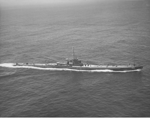 |
1.30k | Starboard side view of the Bass (SS-164), underway, 23 August 1935. Note the unusual raised deck section around and abaft the bridge fairwater. | Partial text courtesy of U.S. Submarines Through 1945, An Illustrated Design History by Norman Friedman. Naval Institute Press. USN photo # 80-G-463342 from NARA, College Park, Maryland, courtesy of Sean Hert. |
|
 |
69k | Commemorative postal cover marking Bass's (SS-164) 10th anniversary commissioning, 26 September 1935. | Courtesy of Jack Treutle (of blessed memory). | |
 |
564k | Port broadside view of B-2 (SS-164), mid 1930's. | USN photo thanks to Jim Kurrasch @ Battleship Iowa, Pacific Battleship Center. | |
 |
78k | Commemorative postal cover marking: Bass (SS-164); Dolphin (SS-169); Porpoise (SS-172); Argonaut (SS-169); Nautilus (SS-168); Cuttlefish (SS-171) Barracuda (SS-163); Narwhal (SS-167) Bonita (SS-165); & Cachalot (SS-170) on Navy Day, 27 October 1935. |
Courtesy of Jack Treutle (of blessed memory). | |
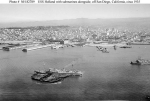 |
94k | Holland (AS-3)
in San Diego harbor, California, circa 1935. Submarines alongside are (from outboard to inboard): Cachalot (SS-170); Barracuda(SS-163); Bass (SS-164); Bonita (SS-165); Nautilus (SS-168); and Narwhal (SS-167). Closest ship in the nest of destroyers at far right is Yarnall (DD-143). |
Photo courtesy of the USNHC, NH # 82789. Photograph from the Bureau of Ships Collection in the U.S. National Archives. | |
 0816905 |
619k | Circa 1936 photo of Bass (SS-164) & Dolphin (SS-169) in Seattle. | Photos courtesy of Gary Mcintosh. | |
 |
69k | Commemorative postal cover marking Thanksgiving Day on the Bass (SS-164), 26 November 1936. | Courtesy of Jack Treutle (of blessed memory). | |
 |
69k | Commemorative postal cover marking Valentine's Day, 14 February 1937, issued from the Barracuda (SS-163) and commemorating all the boats in her class: Bass (SS-164); Barracuda and Bonita (SS-165). |
Courtesy of Jack Treutle (of blessed memory). | |
 |
314k | Bass (SS-164), Artwork by Vernon Howe Bailey. | U.S. Navy photograph # 428-GX-USN 1159532, now in the collections of the National Archives, from the National Museum of the U.S. Navy via flicker.com. | |
 |
565k | 5 photo PDF of showing starboard quarter view of Bass (SS-164) (B-2 still marks her conning tower) in dry dock at the New London submarine base in August 1940 on the occasion of the visit of President Franklin D. Roosevelt to view the defenses in New England. The motorcade is approaching the submarine. At this time, Roosevelt visited Boston Navy yard and the Submarine base in New London. | Source: Life Magazine Archives, Thomas Macvoy photographer, shared by Peter DeForest via Mike Green. | |
 |
32k | Commemorative postal cover marking Bass's (SS-164) recommissioning, 5 September 1940, at Portsmouth, NH. | Courtesy of Jack Treutle (of blessed memory). | |
 |
20k | Commemorative postal cover & photo inset marking first day postal service on Bass's (SS-164) recommissioning, 1 October 1940, at Portsmouth, NH. | Courtesy of Jack Treutle (of blessed memory). | |
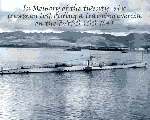 |
175k | On 17 August 1942 while at sea, a fire broke out in the Bass's (SS-164) after battery room and quickly spread to the after torpedo room and starboard main motor, resulting in the death of 26 enlisted men by asphyxiation. This is a commemorative photo honoring their memory. | Text courtesy of DANFS. Photo courtesy of Tom Kermen. Dante's Prayer courtesy of Loreena McKennitt via loreenamckennitt.com | |
 |
50k | Bass (SS-164) is shown here, newly converted to a cargo submarine, off the Philadelphia Navy Yard on 30 March 1943. Conversion was relatively simple because she had a pair of battery-charging engines in addition to the main engines that drove her propellers directly. The battery chargers could drive her electrically (by being connected to her motors), with the main engines disconnected. Thus the main engines could be easily removed to leave space for cargo. Similar flexibility made it relatively easy to remove one or two engines from a much later generation of diesel-electric Gato-class or Balao-class submarines after WW II. Foreign navies, whose submarines were generally directly driven by their diesels, enjoyed no such flexibility. |
Photo & text courtesy of U.S. Submarines Through 1945, An Illustrated Design History by Norman Friedman. Naval Institute Press. | |
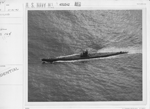 |
1.10k | Bass (SS-164) remained in the Canal Zone until October 1942 when she departed for Philadelphia, arriving on the 19th. After undergoing repairs at Philadelphia Navy Yard Bass proceeded to New London, Conn., where she conducted secret experiments off Block Island in December 1943. She is seen here underway on 16 November 1943. |
Text courtesy of DANFS. US National Archives photo # 80G-450242, from NARA, College Park, Maryland, courtesy of Sean Hert. |
|
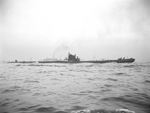 0816430 |
412k | Big Bass (SS-164) at New York Harbor on 9 June 1944 after conversion to cargo submarine. | Image and text provided by Alaska State Library Historical Collections. A Vallejo Naval & Historical Museum photo courtesy of Darryl L. Baker. | |
 |
31k | Bass (SS-164) is shown as built (top) and as stripped for sinking (bottom) after having served unsuccessfully as a cargo submarine. The big compartments fore & aft of the control room (below the conning tower) were the forward & after engine rooms, respectively; the former accommodated the battery-charging engine. Compartments abaft the main engine room were, forward to aft:the maneuvering room above the motor room, crew's quarters above the aft battery, crew's mess, the after torpedo room & the steering gear room. Additional crewmen were accommodated in the small upper deck compartment above the forward engine room. Forward of it were officer's quarters above the forward battery & then the forward torpedo room. As in the earlier submarines, the conning tower was a vertical cylinder. Conversion to a cargo carrier entailed removal of the main engines, so that the after engine room could be used for cargo. The forward & after torpedo rooms were used also for cargo storage. |
Drawing by Jim Christley, text courtesy of U.S. Submarines Through 1945, An Illustrated Design History by Norman Friedman. Naval Institute Press. | |
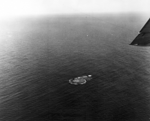 0816427 |
847k | Bass (SS-164) sinks off Block Island, NY, during tests on 12 March 1945. Photographed by aircraft of Anti-Submarine Development Detachment, Air Force, U.S. Atlantic Fleet. | Source: Naval History and Heritage Command, Catalog No. S-284.06 via Mike Green | |
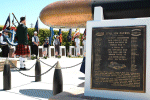 |
669k | Active duty and veteran submariners stand together at the 29th annual "Tolling The Boats" Memorial Service held at the World War II National Submarine Memorial-West, Naval Weapons Station Seal Beach, Calif. May 29, 2006. The ceremony honored members of the Silent Service who gave their lives during World War II and the Cold War for their country and the cause of freedom. | USN photo # N-1159B-052 by Journalist 1st Class Brian Brannon, courtesy of navy.news.mil. | |
| Back To The Main Photo Index | Back To the Submarine Index |
|
Problems and site related matters, E-mail Webmaster |
|
This page is created and maintained by Michael Mohl All Pages © 1996 - 2025 NavSource History |